Today, I’d like to have an honest discussion about whether you should continue helping your ex after a breakup.
In my opinion, it is NOT in your best interest to continue assisting an ex after a breakup.
There are a few obvious exceptions.
- If your ex’s life is in danger
- If you need to help them for the sake of a pet or a child
Well… then these are prime examples of situations where you should absolutely lend a hand.
However, in most cases, what I’ve observed over the years is that exes tend to take advantage of your kindness.
Let’s be clear, the majority of people who visit this website have an underlying desire to reconcile with their ex.
And most exes are aware of this, whether consciously or not.
When they realize that they hold this kind of leverage, they often exploit it.
Therefore, one piece of advice I always give to my clients is that if you feel the urge to assist your ex,
Acknowledge but don’t fix
But before we talk about that let’s go through some of the major risks (in my mind) of helping an ex.

What Are Your Chances of Getting Your Ex Boyfriend Back?
Take the quizThe Three Major Risks of Helping an Ex
In my opinion there are three significant risks to be aware of.
- Emotional risks
- The Benjamín franklin effect trigger
- The possibility that they might take advantage of you.
So let’s delve into the emotional risks.
The Emotional Risks
One thing we know about our client base is that many of them tend to have anxious attachment styles.
It’s important to note that having an anxious attachment style is not inherently wrong, but it does make our clients more susceptible to being triggered by a fear of abandonment, and breakups are a prominent trigger for that.
Also, having an anxious attachment style can foster a codependent dynamic with their ex-partner.
I always like to view relationships on a spectrum.
On one end, you have complete codependency, where a person’s entire life revolves around their partner.
On the other end, you have complete independence, where someone doesn’t desire a relationship at all.
Ideally, what’s best for everyone is to engage in an interdependent relationship, which combines the best aspects of both independence and interdependence.

What Are Your Chances of Getting Your Ex Boyfriend Back?
Take the quizIn an interdependent relationship, partners respect each other’s need for space while also providing support and care when necessary. This is what a healthy relationship often looks like.
However, what tends to happen, especially with anxious individuals, is that the breakup often intensifies their codependent tendencies after a breakup.
They become triggered, and their entire world starts revolving around their ex.
They can’t stop thinking about them.
Scientifically speaking, after a breakup, cortisol levels skyrocket.
For those who aren’t in the know, cortisol is known as the stress hormone.
When cortisol levels rise, individuals are more likely to cling to their codependent tendencies or engage in behaviors like incessantly checking their ex’s social media, driving by their house, or leaving notes on their car or in their mailbox – all in an attempt to make themselves feel better.
Assisting an ex only perpetuates this cycle.
Consider it this way: You’re reeling from the breakup, potentially struggling with codependent tendencies, and suddenly, your ex encounters a problem where you have an opportunity to help them.
You extend your assistance, and it provides a temporary sense of relief.
However, this creates an expectation.
Because you helped them, you expect them to reciprocate or engage with you to a greater extent.
Paradoxically, this goes against the concept known as the Benjamin Franklin effect which just so happens to be the second major risk of helping an ex.
The Benjamin Franklin Effect
So, what the heck is it?
Well, do yourself a favor and watch this video,
In a nutshell, the Benjamin Franklin effect is this really cool concept come up with by, you guessed it, Benjamin Franklin.
He was basically arguing that the expectation that if you do a favor for someone, they’ll do a favor for you back is false. What ends up happening is if you do someone a favor, then you’re more likely to do that person another favor and another and another.
So, “helping” an ex might actually have the opposite effect that you are hoping. In fact, it can actually pave the way for a scenario where it’s highly likely that your ex will just continue to take advantage of your kindness.
They Are More Likely To Take Advantage Of Your Kindness
One of the books I frequently recommend to my clients following their breakup is authored by Sherry Argov, titled “Why Men Love Bitches.”

What Are Your Chances of Getting Your Ex Boyfriend Back?
Take the quizIn this book, Argov argues:
That nice girls often end up being used as doormats.
Essentially, if you’re too kind to your ex or to a guy, the Benjamin Franklin effect comes into play, and they may continue taking advantage of your kindness.
It’s a somewhat Machiavellian concept – the idea that the “bad guys” always win while nice individuals finish last. If you aren’t familiar with Niccolò Machiavelli’s renowned philosophy presented in his book, “The Prince” then you’re about to get a crash course,
“The Prince” was written as advice for a future ruler of Italy, based on Machiavelli’s observations of successful rulers versus those who were not.
Machiavelli suggested that virtuous behaviors such as honesty, integrity, and kindness might not always serve a leader well. Sometimes, being deceptive, manipulative, or ruthless is more effective in maintaining power and control.
It’s crucial to understand that Machiavelli didn’t advocate for evil actions for the sake of being evil; rather, he presented a practical guide based on the political realities of his time. He recognized that leaders often had to make tough decisions that might not align with conventional virtues, following the simple concept of:
The ends justify the means.
This aligns with my advice on how to handle an ex whom you feel compelled to help.
It’s in line with the idea of acknowledging the problem but refraining from fixing it for them.
An example that comes to mind is from one of our coaches, Coach Shana.
Coach Shana was one of our earliest success stories when we started Ex-Boyfriend Recovery and our community back in 2016. She is undoubtedly one of the kindest women my wife and I have ever met. When she went through her own devastating breakup, she had a newborn and shared a child with her ex who had walked out.
During her breakup process, we advised her not to make it easy for her ex. Despite wanting her ex back and desiring a whole family, we encouraged her to act unbothered and focus on herself. If her ex approached her with problems, it was okay to acknowledge them, but not to fix them. The goal was not to make her ex’s life more miserable without her than they thought it was when they were together.
Over time, this approach proved successful. It was the first time we witnessed this concept in action – a realization that although it might be difficult, the ends might justify the means, drawing from Machiavellian philosophy.
What I find challenging about this is that the individuals we coach often have anxious tendencies, and they genuinely mean well. They are kind-hearted individuals who, despite occasionally resorting to unusual problem-solving methods, are driven by kindness.
Unfortunately, it’s these types of individuals who are often taken advantage of the most.
Real Examples Of Exes Taking Advantage Of Kindness
To actually prove this point, I conducted research in two different places.
- First, I went to our private community and gathered a few examples of people discussing how their exes had taken advantage of their kindness, either towards the exes themselves or towards others.
- Then, I visited Reddit to see how many people were searching for similar experiences.
As it turns out, there are numerous individuals sharing their stories. Let’s start with the reddit examples first,
In this example this person says, “My boyfriend takes advantage of my generosity. In fact, he feels entitled to it. I’m fed up.”
They go on to provide a detailed explanation of the situation.
Another example states,

What Are Your Chances of Getting Your Ex Boyfriend Back?
Take the quiz“All my friends think that my ex is taking advantage of me,” followed by a thorough description of the circumstances.
But reddit is… well, reddit.
Let’s turn our attention to examples in our community.
The most fitting example I found from our community happened to be quite brief, so we can’t delve deeply into it like the second one.
The individual stated,
“After my ex took advantage of me, I don’t want to be a fixer or healer in my next relationship. Any advice on how to avoid repeating the same mistake?”
So, to address this individual’s question, the best advice is to apply the concept I mentioned earlier: acknowledge the problem but refrain from fixing it.
One of the biggest issues people face in relationships is the expectation that once they are in a relationship, their partner will fix all their problems.
What people struggle to realize is that it doesn’t work that way.
Each person must take responsibility for their own issues and continue to progress during challenging times. Therefore, when someone approaches you, takes advantage of your kindness, or seeks help, it is crucial to acknowledge the problem and validate their feelings, but it is not your responsibility to fix it for them.
Here’s perhaps the most blatant or unusual example of this dynamic in action.
This individual shared their experience, saying,
“I messed up big time. I spent a great day with my ex’s best friend, who is a girl. We had coffee, shopped around, went to the river, and visited her boyfriend’s house. We had some girl talk while ordering food delivery. My ex called her while we were out, discussing finances since she owed him for helping with her apartment. She mentioned that the day with me was going well. In response, my ex started talking negatively about me and expressed lingering doubts. I felt betrayed, but she defended me. I know she believed that I was using her to get to him, which is not true. I genuinely wanted to be friends with her. We talked it out and resolved the issue. But why would my ex act so cold? He claims he wants to be friends, but then pulls a stunt like this, even after she told him I was in the car on speaker.”
This situation exemplifies the Machiavellian philosophy I’ve been harping on.
Sometimes, even if you are genuine and authentic with someone who used to be friends with your ex, they can still portray you as the villain.
It reminds me of the seductive quality of anger.
It is often easier for someone to make you the bad guy instead of owning up to their own mistakes.
I can imagine this ex, knowing you were in the car and feeling nervous, being unable to admit to himself that he might have made some errors. So what does he do?
He lashes out, taking advantage of your kindness to others and mocking it. It’s hurtful, but if you understand why he’s doing it, you can see it as a coping mechanism for him, allowing him to avoid facing reality.
I’ve recently contemplated people’s obsession with rags to riches stories, followed by their inclination to tear someone down once they achieve success, only to cheer for their comeback in what is often referred to as a “comeback tour.”
I see a correlation between that concept and the situation described above. This person was simply trying to have an authentic connection with a friend, but the ex wants to portray her as the villain because it’s easier to tear her down than to accept that she’s genuinely being herself.
So, if you’re not allowed to help your ex, what can you do?
Outgrowing Your Ex Is ALWAYS The Key
To support this point, I found another success story.
This person’s account seems to reinforce what I have been saying for the past three years.
“I successfully got back with my ERP ex. ERP stands for the Ex Recovery Program. It’s a chaotic and dramatic rebound story. What worked was growing myself. This story revolves around our second breakup. I was the anxious one, and he is a fearful avoidant. He broke up with me, and I resorted to begging, pleading, and nagging. It took me a while to find this program. I entered a period of no contact, aiming for a 45-day rule, but I broke it on the 33rd day when he reached out. Five months after the breakup, we started talking and realized he was breadcrumbing. I went no contact again. He reached out, but I didn’t respond. Then, on the 29th day, I reached out. We started sleeping together, but he became disrespectful, so I initiated no contact once more. He started calling and texting, but I didn’t answer, even when he reached out on my birthday. On the 31st day, he called again, and this time I picked up. He hinted at a wonderful date, implying we were back together, but there was tension. Eventually, I demanded to know where we stood and expressed my readiness to walk away. That’s when he committed. He had attempted to establish a friends-with-benefits situation, but I confronted him and made it clear that he would not get a hall pass from me. It was either all in or all off for good. He was in tears. His fear of influence also contributed to the breakup, but they too intervened to have me back because the tables had turned. We were broken up for nine months, and he experienced the grass-is-greener syndrome until reality hit him. Sometimes, we just need to be able to leave. Perhaps that’s the process of outgrowing. I love him, but I love myself first. Now, things are going well, but the work continues. I focused on becoming the best version of myself, completing my post-grad studies, securing a job, making myself stand out, and realizing that I didn’t actually need him to be happy.”
(Gosh that was long… sorry.)
What we can gather from this individual’s success story is that focusing on helping yourself rather than helping your ex is the most productive use of your time.
This aligns with the Machiavellian philosophy, where the ends justify the means.
Sometimes, ignoring your ex justifies the means.
Sometimes, not assisting them and instead prioritizing your own growth justifies the desired outcome.
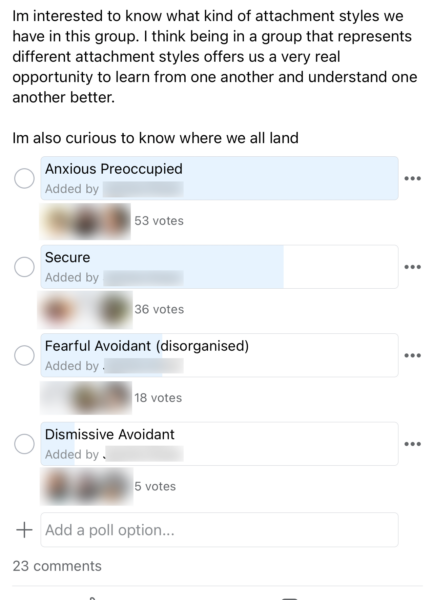
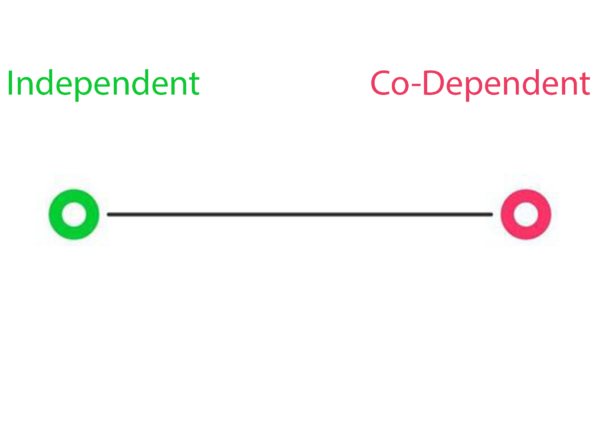
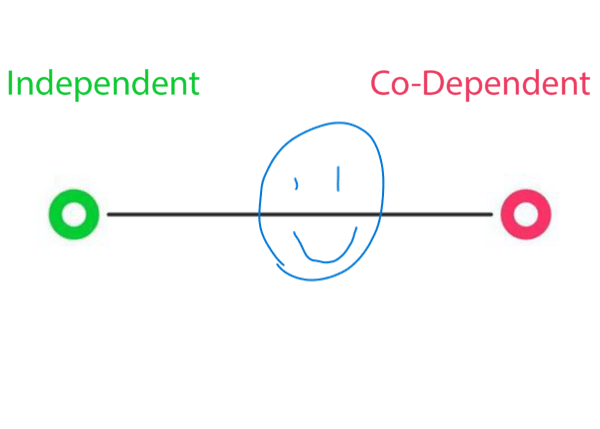
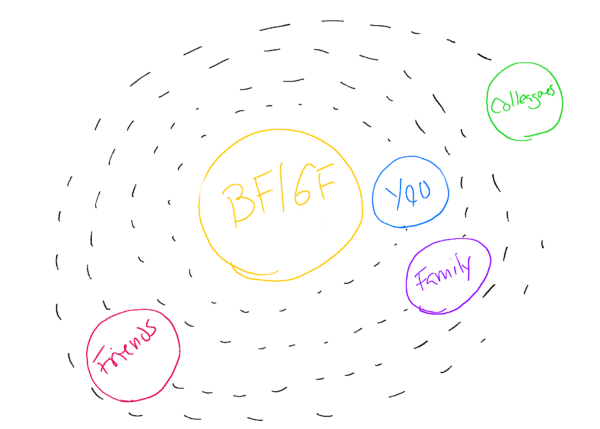
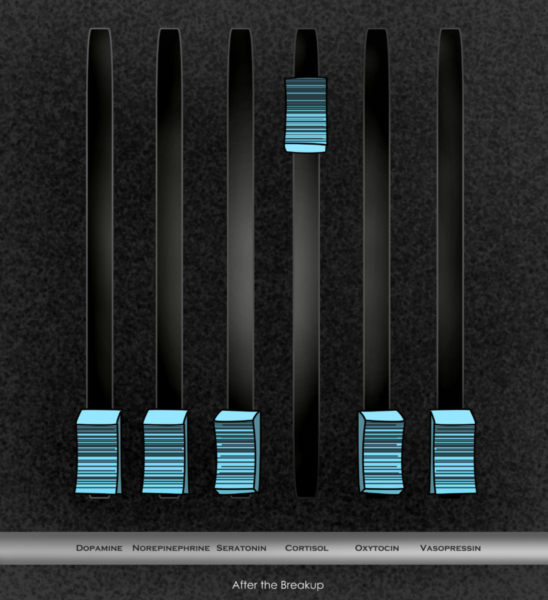
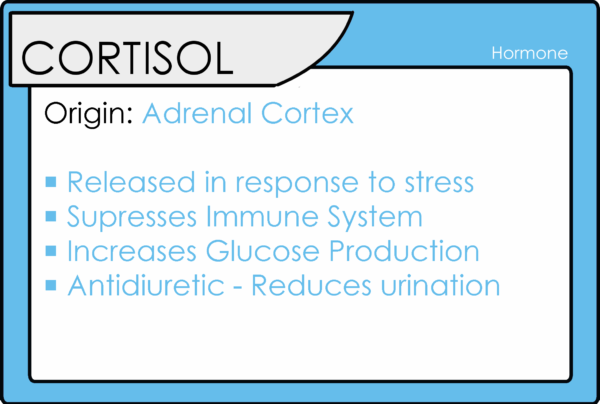
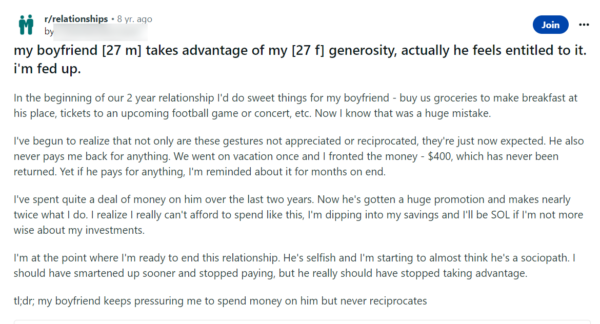
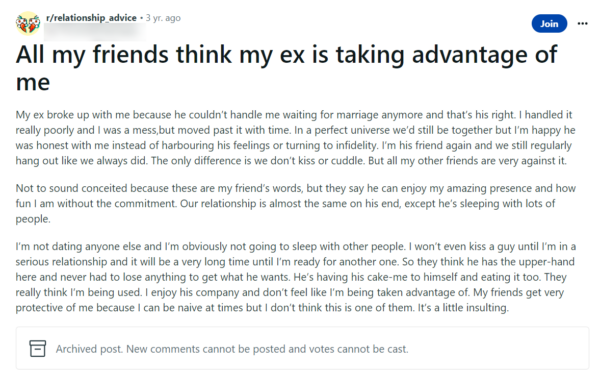

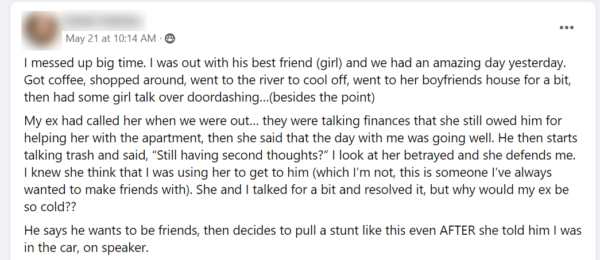
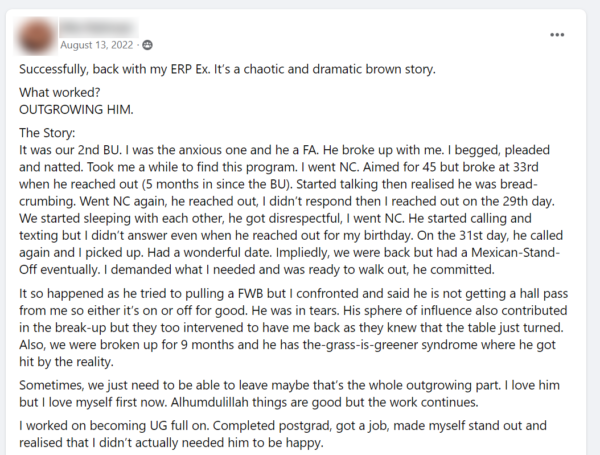
Ana Gostovic
January 17, 2025 at 11:57 pm
I wanted to reach out because I’ve been struggling emotionally, and I think it’s time I talk to someone about it.
Over the past year, I’ve been stuck in this mental loop about my ex. Despite trying multiple times to fix things with him, it became clear that he doesn’t want to reconcile. The logical part of me knows I should let go, but I can’t seem to stop thinking about him. Even now, after all this time, he’s still in my head, and it’s been affecting my ability to move forward.
I’ve even rejected other men who’ve shown interest in me because I’m so caught up in this unresolved situation. I know it’s not fair to myself or to them, but I just can’t seem to let this go. Honestly, it’s exhausting, and I feel like I’ve become my own worst enemy in this situation.
I guess I’m writing because I need help understanding why I’m holding onto this so tightly and figuring out how to move forward in a healthy way. I’d really appreciate your guidance on this.